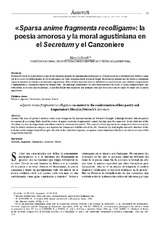«Sparsa anime fragmenta recolligam»: la poesía amorosa y la moral agustiniana en el Secretum y el Canzoniere
«Sparsa anime fragmenta recolligam»: an answer to the condemnation of love poetry and Augustinian’s Moral in Petrarch’s Secretum
Autor
Borelli, Marcela
Editor
Asociación de Estudios de Ciencias Sociales y HumanidadesFecha
2018Materia
PetrarcaAgustín
Canzoniere
Secretum
Poesía
Petrarch
Augustine
Canzoniere
Secretum
Poetry
METS:
Mostrar el registro METSPREMIS:
Mostrar el registro PREMISMetadatos
Mostrar el registro completo del ítemResumen
El tema del valor de la poesía no escapa de las tensiones propias del pensamiento petrarquesco. Si bien la poesía es defendida por Petrarca como
vía de acceso a la verdad, fuente de elevación moral, no corre la misma suerte la poesía vulgar. En la tercera jornada del Secretum es condenada
la poesía amorosa en el marco de una moral agustiniana. Esta condena que parecería ser definitiva no explicaría por qué continúa componiendo
y organizando el Canzoniere hasta sus últimos días. Sin embargo, atendiendo a la estructura narrativa del texto, a ciertas composiciones que
estructuran la recolección de poemas, es posible hallar una respuesta que permite conciliar la recolección de rimas de amor con la moral
agustiniana. AbstractThe issue of poetry’s intrinsic value is no stranger to the internal tensions of Petrarch’s thought. Although Petrarch defends poetry
as a means of accessing Truth, itself the source of moral elevation, vulgar poetry cannot, for him, play the same role. In the third day of the
Secretum, he uses an Augustinian moral framework to condemn love poetry. This censure, which appears to be categorical, does not explain
why he would continue to compose and organise his Canzoniere until the end of his life. However, by studying the narrative structure of the
text and certain compositions which give structure to the collection of poems, a response can be formulated which reconciles these verses with
Augustinian morality.

